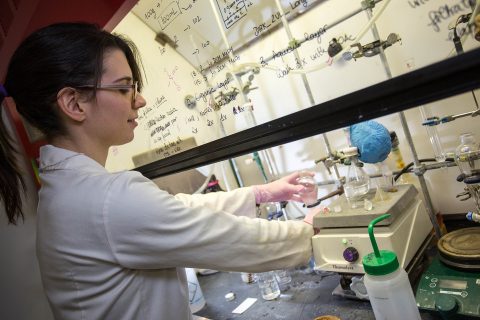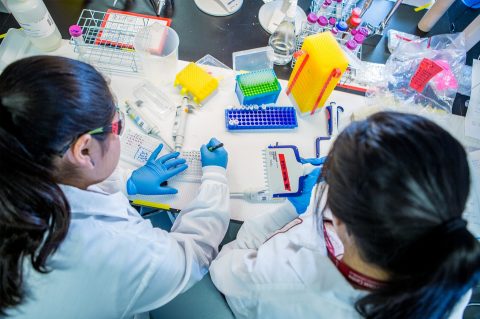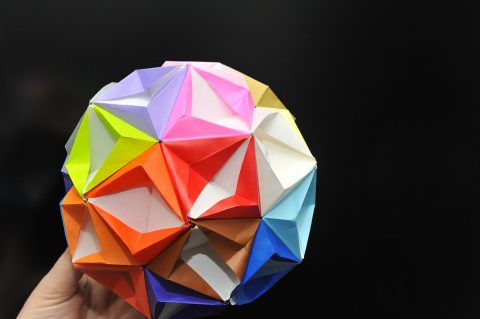Physics (BSc)
Virtual information sessions
Discover what makes Concordia's Faculty of Arts and Science stand out as a leader in the humanities and social and natural sciences, including academic opportunities, hands-on learning and how to achieve your goals.
Why study Physics?
Studying Physics sends you on a journey to the end of the universe or into the centre of an atom. When you study the science of energy and matter, you examine the dynamics of a relationship that has kept great thinkers busy for millennia. Today physicists build lasers, design medical imaging machines and develop applications for nanotechnology. So if you’re ready, sharpen your reasoning skills and open your mind — physics is a discipline that demands as much curiosity as it does strength in mathematics.
As a Physics student, you’ll choose the Physics option, or examine the role of physics in the life sciences in the Biophysics option. You’ll receive a thorough foundation in all branches of physics, including mathematics, classical mechanics, electricity and magnetism, waves and optics, quantum mechanics and modern and theoretical physics.
Graduates leave the program with the knowledge and creative thinking skills required for graduate studies or a career in the pure or life sciences.
Special funding for out-of-province students
Up to $4000 for undergraduate programs.
Program structure
A Bachelor of Science degree takes a minimum of three or four years (90 – 120 credits) of full-time study, depending on your academic background.
Program options
- Specialization in Physics – Physics option (66 credits)
- Specialization in Physics – Biophysics option (66 credits)
- Major in Physics (45 credits)
- Minor in Biophysics (24 credits)
- Honours in Physics – Physics option (69 credits)*
- Honours in Physics – Biophysics option (69 credits)*
*Honours is a highly concentrated program, ideal for students planning to continue to graduate studies. If you are interested in Honours, speak with your program advisor in your first year of study at Concordia. Students applying to the University are able to apply to the specialization or major.
Courses
Co-op program
The Co-op program gives you the chance to complete paid work terms that last 12 to 16 weeks. As a Co-op student, you will work for firms where you may:
- Perform spectroscopy work
- Take measurements of solar cells
- Develop software or computer interfacing protocols
- Develop models to predict the behaviour of lasers and optics systems
- Test survey hypotheses
Students interested in applying for the Physics co-op should refer to the Undergraduate Calendar where a full description of the admission requirements is provided.
Academic content is very similar to that of the regular programs, with some specific recommendations for courses to improve the students' job skills. While it is hoped that most of the positions will be in the Montreal area, students must be prepared to work in other parts of Canada.
Students are supervised personally and must meet the requirements specified by the Faculty of Arts and Science and the Institute for Co-operative Education in order to continue their studies in the co-op format.
Liaison between the student, the employers, and the Institute for Co-operative Education is provided by the Physics co-op committee, which includes the student's advisors.
United States students: A U.S. Federal Student Aid-eligible version of this program is offered. This version meets all U.S. regulations (such as no co-operative education or e-courses) for eligible programs.
Admission criteria
Minimum cut-off averages and course requirements
- Quebec CEGEP: 24
- Calculus 1 and Calculus 2 – Mechanics, Electricity and Magnetism and Wave, Optics and Modern Physics – General Chemistry and Chemistry of Solutions – General Biology OR Natural Science DEC OR DEC intégré en sciences, lettres et arts.
- Additional information for CEGEP applicants
- High School: C+ overall, B- in math, C+ in sciences
- Completed courses in the disciplines of Calculus, Biology, Chemistry and Physics.
- One math from Pre-Calculus, Calculus, or equivalent
- Two sciences (from Biology, Chemistry or Physics)
- ACT or SAT is NOT required
- Canadian curricula course requirements
- Accepted international qualifications
- Completed courses in the disciplines of Calculus, Biology, Chemistry and Physics.
- International Baccalaureate (IB) diploma: 26 overall, 4 math, 4 science
- one math (Applications and Interpretations HL, Analysis and Approaches HL or Analysis and Approaches SL)
- one science (Physics, Chemistry or Biology, either SL or HL)
- one of the math or science courses must be completed at the HL level
- International Baccalaureate Career-related Programme (CP): 26 overall, 4 math, 4 science
- Same as International Baccalaureate Diploma Programme (DP) requirements
- Additional Career-related Programme (CP) course requirements
- Baccalauréat français: 11 overall, 12 in math, 11 in science
- Première: Spécialité mathématiques AND Spécialité physique-chimie
Terminale: Spécialité mathématiques (also accepted, Spécialité Physique-Chimie AND Mathématiques Complémentaires)
- Première: Spécialité mathématiques AND Spécialité physique-chimie
- British system of education (GCE):
- A-levels: At least two A-level exams CD, C in math, C in science or
- AS-levels: At least 4 AS-level exams with equivalent results or
- BTEC: Level 3 Diploma or Extended Diploma in a related subject area with equivalent results
- Students without math or science A-levels may be admissible based on AS-level or iGCSE/GCSE/O-Level exam results. Students should include all their exam results from iGCSE (or equivalent) onwards to support their application.
- Additional information for British System of Education (GCE) applicants
- University Transfers (internal/external): C+ overall, C+ in math / sciences
- Completed courses in the disciplines of Calculus, Biology, Chemistry and Physics.
Minimum cut-off averages should be used as indicators. The cut-off data may change depending on the applicant pool. Applicants who meet the stated minimum requirements are not guaranteed admission to these programs.
Application deadlines
It’s not too late to apply
Most undergraduate programs are still accepting applications for fall 2025.

FALL ENTRY (September)
Deadline: March 1
International applicants: Apply no later than February 1 to allow time for immigration document processing. However, applying earlier is strongly recommended. Immigration processing times vary by country, and delays could prevent you from starting your studies on time.

WINTER ENTRY (January)
Deadline: November 1
International applicants: Apply no later than August 1 to allow time for immigration document processing. However, applying earlier is strongly recommended. Immigration processing times vary by country, and delays could prevent you from starting your studies on time.
We reserve the right to close admission to a program at any time after the official deadline without prior notice.
After your degree
Graduates leave the program with the knowledge and creative thinking skills required for graduate studies or a career in the pure or life sciences.
Montreal is a hotbed of startup culture and health research. Many Physics alumni pursue graduate studies and work at the forefront of technological innovation. They have established careers in a variety of scientific fields that include:
- Nanotechnology
- Medical imaging and radiation treatment
- Energy
- Telecommunications
- Laser and satellite design
Biophysics graduates will be in a powerful position when it comes to taking a leadership role in a team of scientists and engineers, since they will be trained in big-picture thinking, with the knowledge and tools to cross the boundaries of traditional academic disciplines.
Student story

Mariya Krasteva
Honours in Physics (Co-op)
From Montreal to the European Space Agency, Mariya Krasteva’s independent thinking opened doors.
Other programs of interest

As a biochemist, you will study the chemical processes that occur within the cells of living organisms.
Department
Department of Chemistry and Biochemistry
Faculty

Get inspired by life. Immerse yourself in the study of life at all levels: from the edge of biochemistry through cell biology and the physiology of multicellular organisms to the interactions between organisms and their environment.
Department
Faculty

Mathematics is a universal language that explains the currents of the ocean, string theory, the spiral of a snail’s shell or the growth of a fern.
Department
Department of Mathematics & Statistics
Faculty


